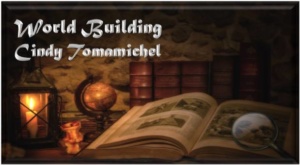Water is the universal solvent, enabling life on Earth, and dissolving the hardest rock to soil over time. It can be the lightest mist, a cloud scudding across a sky so blue it hurts your heart. A mighty torrent of water, tearing giant trees from the banks, washing man and beast before it in a flood to end all floods. A storm that tosses the ships into kindling, destroying the dreams and hopes of an explorer, and sending the sailor’s families into dire poverty. A chill rain with sleet or hail, that shields the approach of a hooded assassin. Or a lazy river where two boys punt a raft down and gossip with all the time that youth possess.
 Does your world have all the water it should have? Oceans fed by rivers, swamps in low lying areas, springs or underground reserves? Does your story reside exclusively in one of these worlds? I read many years ago a story set entirely underground, where the people had evolved echo location and infra red vision to adapt to a world of total dark. I wish I could remember the title. Jeanette O’Hagan in her “Blood Crystal” series imagines a world of underground dwellers. Do demi gods dwell in the waters? Naiads, Poseidon and mermaids are just some of the magical creatures people have imagined for water dwellers.
Does your world have all the water it should have? Oceans fed by rivers, swamps in low lying areas, springs or underground reserves? Does your story reside exclusively in one of these worlds? I read many years ago a story set entirely underground, where the people had evolved echo location and infra red vision to adapt to a world of total dark. I wish I could remember the title. Jeanette O’Hagan in her “Blood Crystal” series imagines a world of underground dwellers. Do demi gods dwell in the waters? Naiads, Poseidon and mermaids are just some of the magical creatures people have imagined for water dwellers.
Or is it a far distant planet where water is at a premium? “Dune” is set in a desert world, as is Randall Garrett’s “Gandalara” series where the animals have evolved a way to concentrate urine to reduce water loss. This feature was used to enable the main character to realise he was no longer on Earth. Other imagined worlds are nearly all water, sometimes involving Atlantis. One interesting book on this is the “The Watch Below” by James White. A great writer of scifi, he tells the parallel story of humans trapped in a WW2 ship underwater for generations, and a water dwelling race of aliens travelling to earth in a multigenerational ship.
Another interesting aspect that may be of interest to scifi or apocalypse authors is the past evidence of water, or heritage issues from past industrial practices. The canals of Mars have had a lot of play in novels including Robert Heinlein’s, “Red Planet Mars” and James Blish talks a lot about the Martian landscape and the frozen subsurface permafrost that is a lifesaver in “Welcome to Mars”. Permafrost is also used to preserve food in “Mammoth Hunters” by Jean Auel, where storage is dug down into the tundra. However industrial and agricultural contamination today is a real issue, and already a lot of groundwater is polluted and often unfit for human consumption for many lifetimes. For post apocalypse authors, the finding of a well in even a remote farmhouse by their dehydrated characters may be just the start of their problems.
Water can also be a source of wealth in a land where it is a scare commodity. Does this affect or create a social structure? Or does abundant rainfall on fertile soil make life too easy? What happens when war over runs a peaceful agricultural region? Or desert takes over a mighty civilisation as climate changes? Or glaciation grinds across the planet with a new ice age? There is a great short story, well ahead of its time – “Cocoon,” by Keith Laumer in Fantastic Stories of the Imagination, Dec 1962. The entire human race is in life support cocoons, attached to screens and social media, and ignorant of the impending doom posed by the glacier that will wipe out everything.
So water is important for existence, and can play a focus in a world you build. From ships to drinking water, to navigation to climate change and evolution, water is there, playing a pivotal role.


I remember being on holiday in the Sinai desert. We’d been driven around the mountains for hours – it was just rock and blue sky and some scrubby vegetation. We reached a borehole and the guide turned the valve to le the water spring up. In the space of a few seconds I understood why the religions of the area place so much emphasis on water – it’s just so liquid, for want of a better word.
Yes, water’s important, on all sorts of levels.